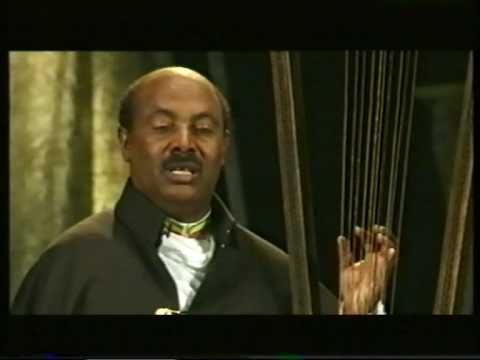AddisAbabaBand is Danish 13 member ethio fusion jazz band from Aarhus, Denmark playing music inspired from afrobeat, funk and jazz.
The band was formed in 2010.
AddisAbabaBand - Zion
AddisAbabaBand is as exotic as afrobeat from Aarhus, where the 12-13 man band (they are obviously even in doubt) mixes everything from African rhythms of free jazz and psychedelic rock to funk. It might be a half-pale game, but the Aaroans will happily kick a lot of life and variation into the 10 tracks of the album.
Just the variation is the key to some of the success here, because one must be uncommonly demanding if you get bored or dozens under the 10 tracks AddisAbabaBand delivers on this debut album. 9 of the numbers are their own compositions, and then there has been room for a single cover number in the form of Girma Bèyènès afrobeat classic "Musiqawi".
And if you think hm hmmm, oh well, yes, yes. I do not know that. Do not worry, I'm in as unexplored territory as you like! My knowledge, and also interest in, afrobeat and the like, confines myself to random meetings at the Roskilde Festival (where I have always been well entertained) and so I know there is someone called "Kuti". And "Ebo Taylor". Fortunately, they mention AddisAbabaBand as inspirational sources in the press so I do not have to feel like the whiteest ignorant man on the musical savannah.
What is the result of that? Certainly a kind of cultural disability, where I'm only available to hear more "western" music. So besides, I also hear some old school hip hop. Hmm ... okay, my defense is a little thin. Perhaps I just did not find or take the time to put myself in the afrobe, partly because of a massive jazz scare that has plagued me for decades, but now under control.
In short, I'm on a small bar bottom, just like the rest of the editors, and do not have the big comparison or reference points that can be pulled out of the toolbox to judge what AddisAbabaBand has captured on the record here. But then we have to go a little differently to work and cautiously feel a little bit - at risk of judging the cases a bit wrong. Itcould be both an advantage and a relief for the band.
Now, with these reservations, I think I really like AddisAbabaBand's deal with the debut. It fluctuates, it is quite sharp, without the feeling of spontaneity and improvisation that I imagine is a fairly large part of the "genre", lost and, in particular, it is well-played. At no time do I think that it's 12-13 Aaronians who take me on an afrobeat excursion, not that music should be thought of in the suit of the practitioner's skin, but there's hardly any worse than an unfunky white man, who thinks he has rhythmic sense.
The numbers are mostly instrumental, which would normally also be a challenge to me, but as mentioned, the plate slides very smoothly and unproblematically, or should you say dances? So the absence of a vowel does not become a brake pad for me. When it finally appears on the album's 6th song, "Skyrim" feat. MhukayesangTarharka J., it gives just a nice spit and extra spice to the already tasty musical dish.
In court you will find everything from songs with a dance-friendly smearing spy movie's feel like "White Man", the more fast-paced, frugal sounding and exciting "Pizzaro", smoked night stamp on
"Piakågerenout" with a deep blow to the mess that you can hear spit freaks. On a song like "Illuminati", the dance-friendly rhythms become more sweaty and warm, while "Jojpe" has some 70's ghetto swag blacksploitation soundtrack over.Most "African" will probably be on "Zion" where, due to the lack of better words, jungle rhythms are almost in it, while "Musiqawi" delivers the most hypnotic moment of the record with insistent rhythms and, eventually, humming cows.
The common denominator of the 10 numbers is that everything is pretty trimmed and greasy fried away. The playing time never feels blown up, despite the fact that the music is never overloaded or too complicated, the soundtrack is in spite of being unlucky or unstructured.
I'm still struggling emotionally to relate to the tones and thus get completely absorbed by them, but if you feel like me, I think that AddisAbabaBand could work like a really nice, fairly easily accessible, but still not for the easy leg, introduction to the afrobeate.
Say goodbye to a dozen Aarhusians!
Ken Damgaard Thomsen
AddisAbabaBand - 01 - Jojpe (4:47)
AddisAbabaBand - 02 - White Man (3:43)
AddisAbabaBand - 03 - Illuminati (3:10)
AddisAbabaBand - 04 - Musiqawi (5:49)
AddisAbabaBand - 05 - Zion (4:04)
AddisAbabaBand - 06 - Skyrim feat. Mhukayesango Tarharka J. (4:26)
AddisAbabaBand - 07 - Pizzaro (5:13)
AddisAbabaBand - 08 - Piakagerenout (4:38)
AddisAbabaBand - 09 - Meter (2:25)
AddisAbabaBand - 10 - Pangea (4:13)
Alto Saxophone, Baritone Saxophone – Lasse Enøe
Bass, Percussion – Jens Peter Møller
Drums – Martin Aagaard Jensen
Guitar – Jesper Rasmussen, Mikkel Govertz
Keyboards – Simon Gorm Eskildsen
Percussion – Feike Van Der Woude, Martin "Muskel" Madsen
Tenor Saxophone – Olaf Brinch
Tenor Saxophone, Flute – Marco Dania
Trombone – Christian Tscherning Larsen
Trumpet – Jakob Sørensen
Violin, Vocals, Percussion – Preben Kaels
Vocals, Mbira – Jimmy Mhukayesango Tarharka


















.jpg)
